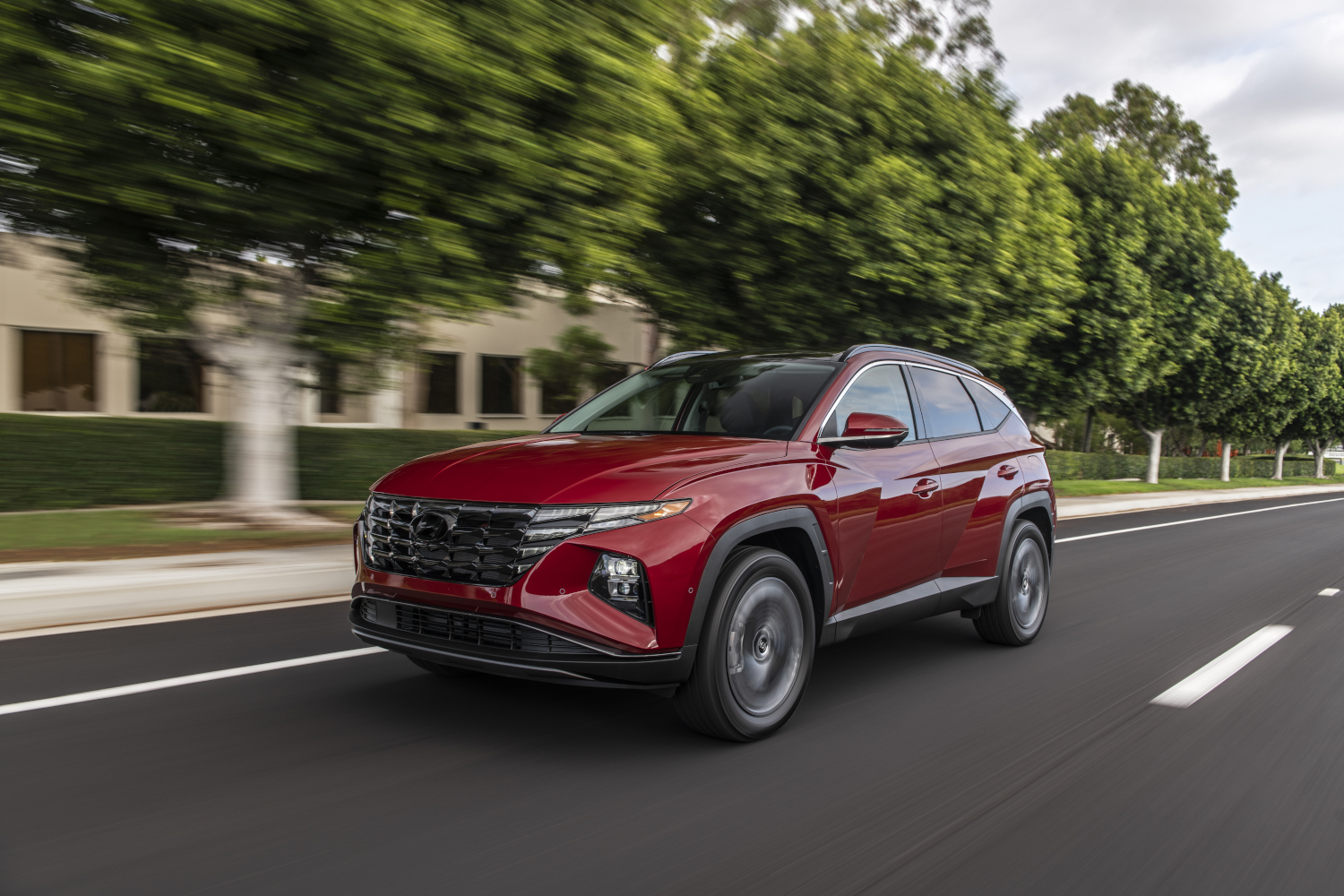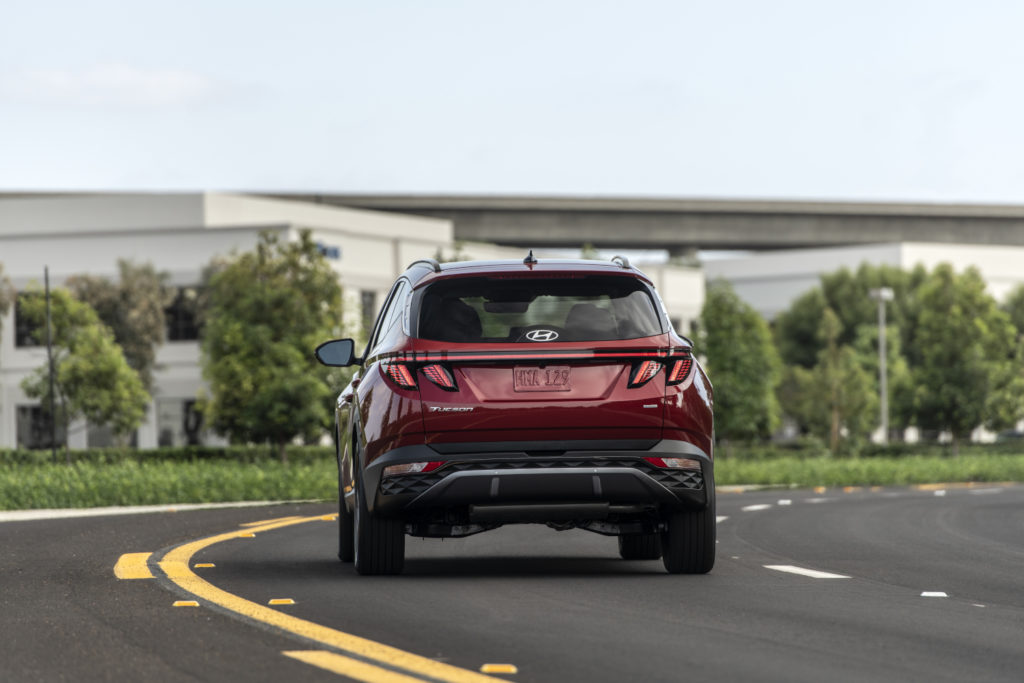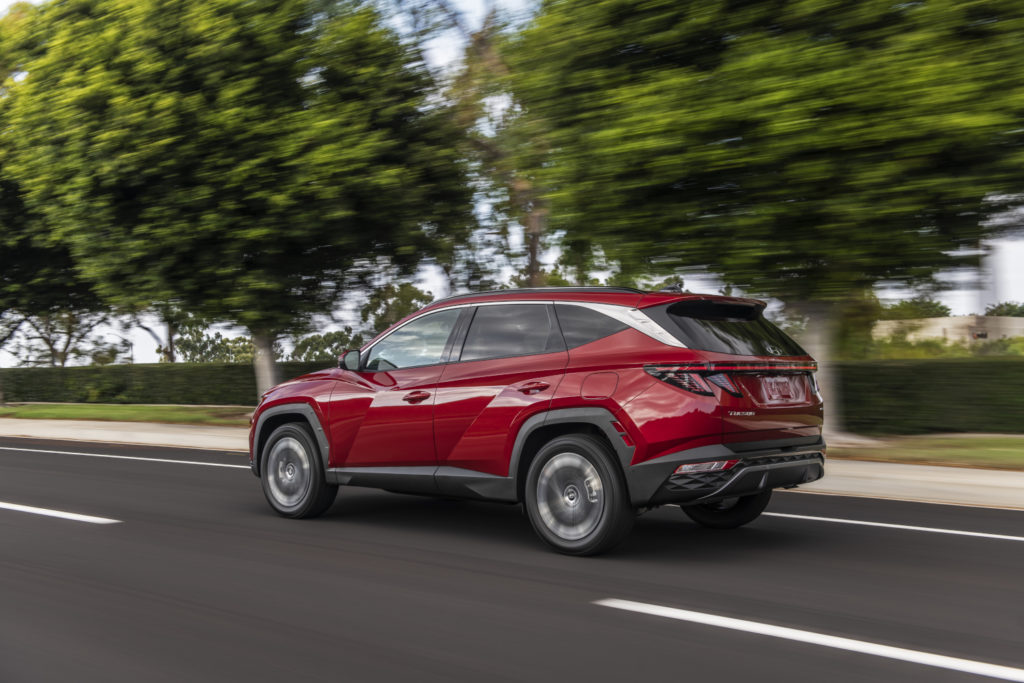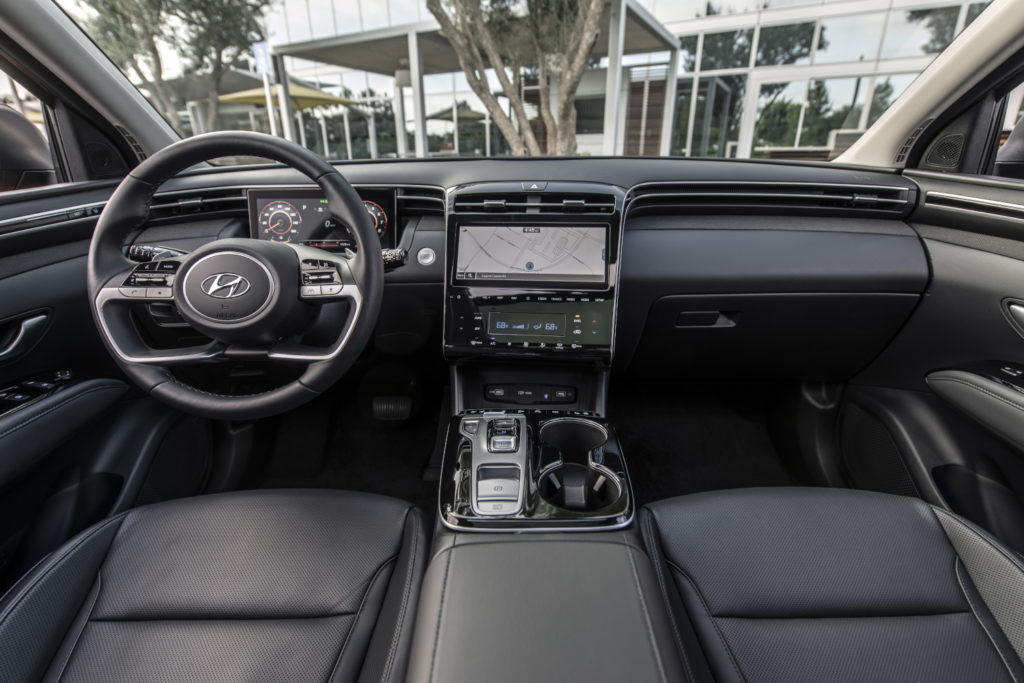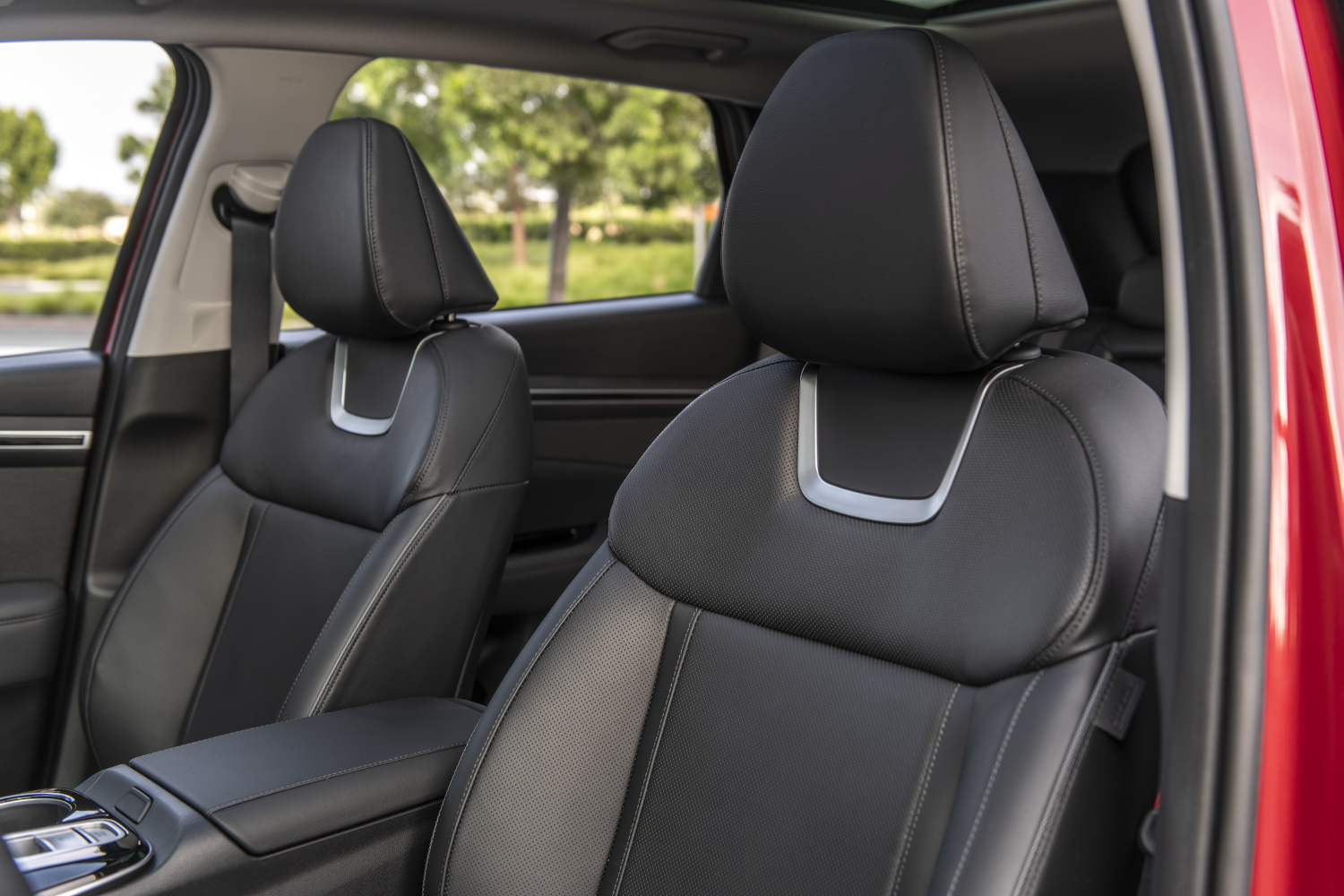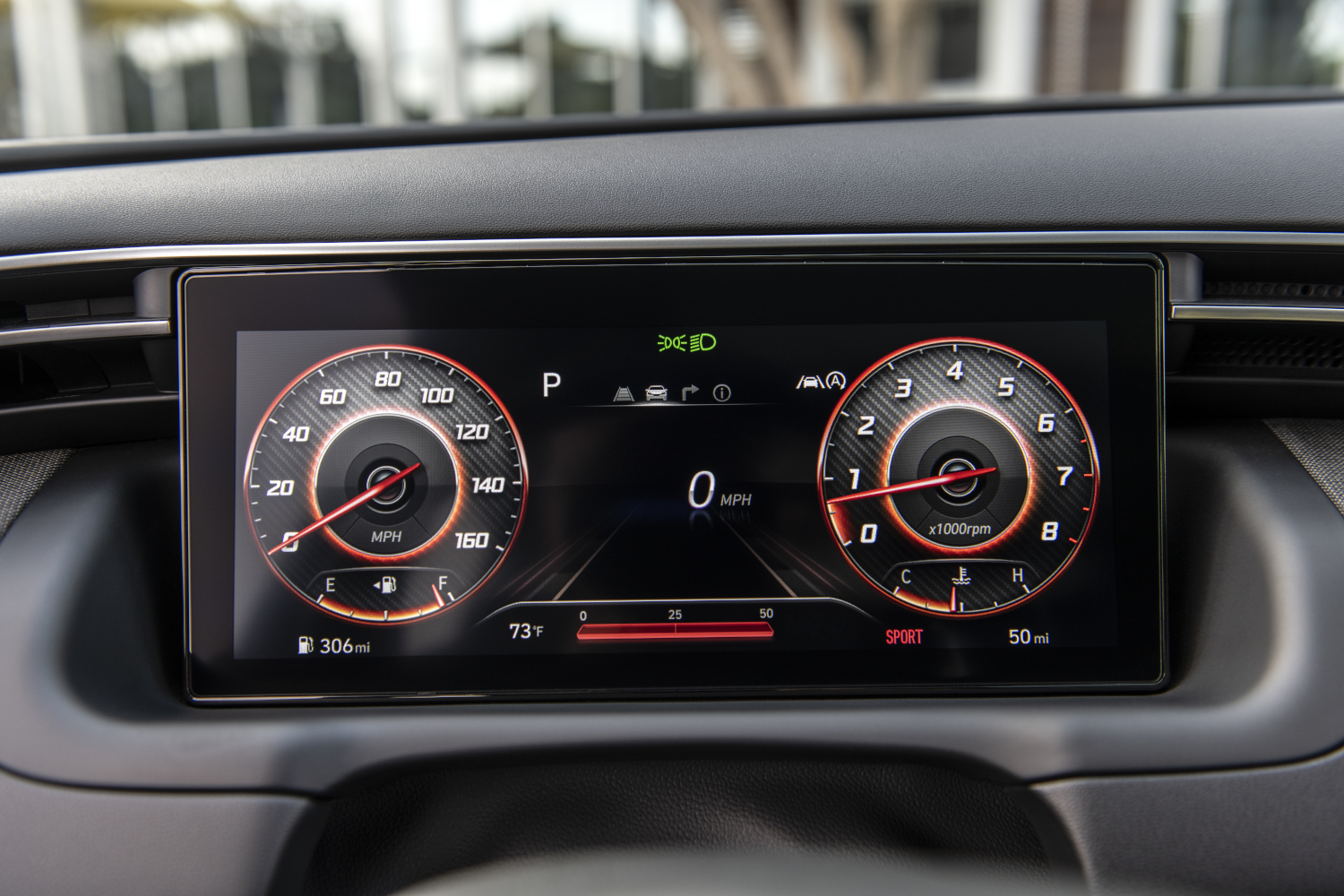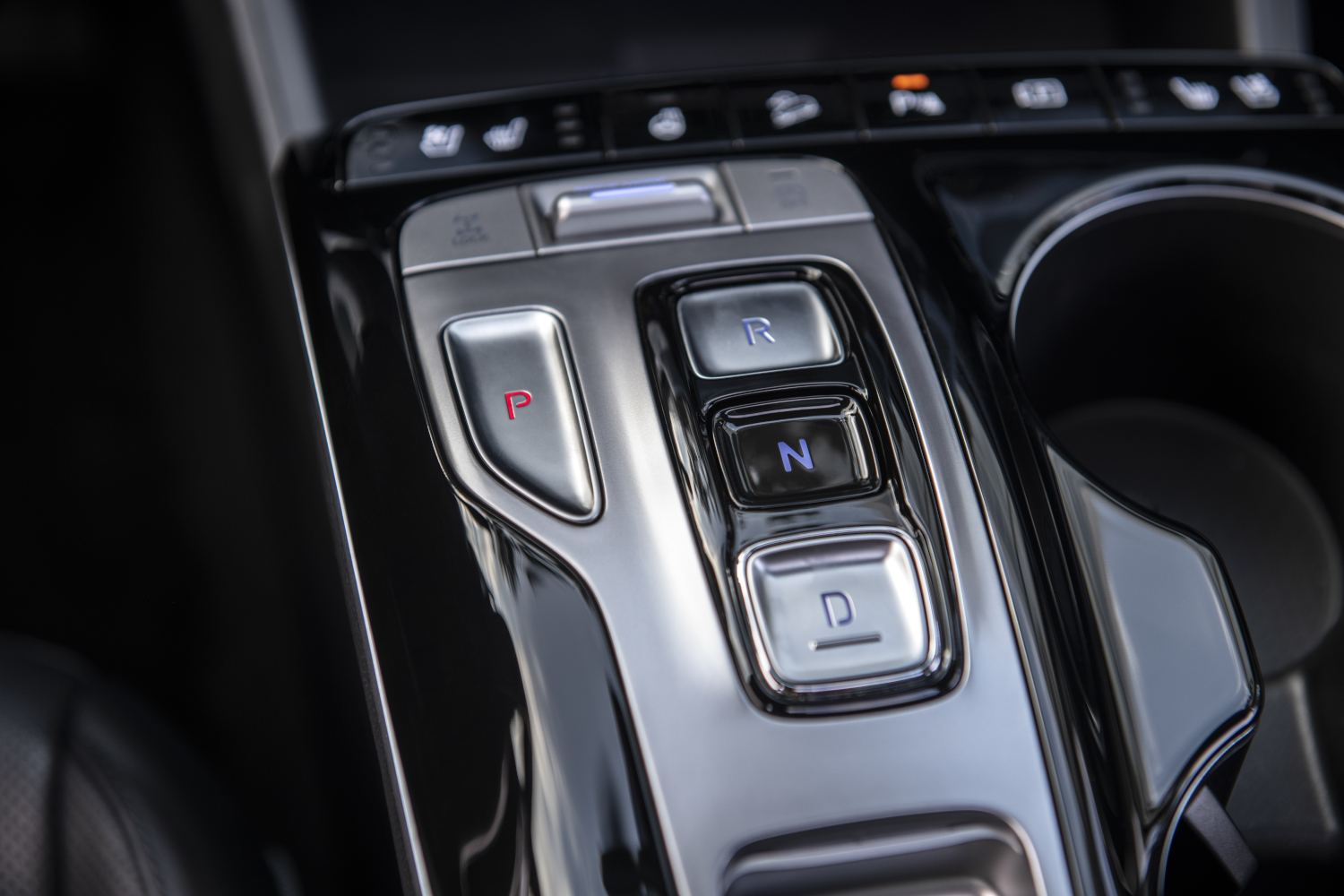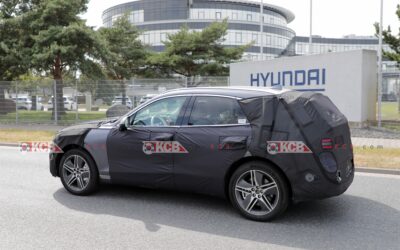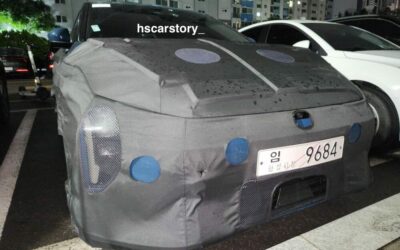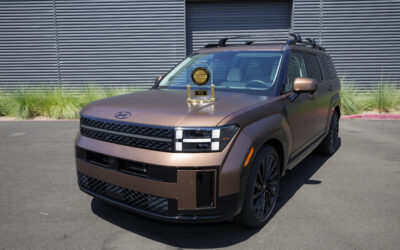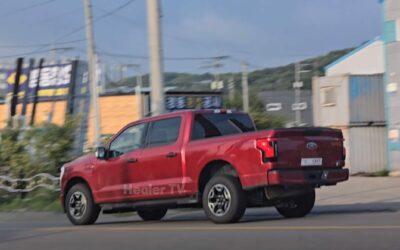Hyundai today unveiled its innovative 2022 Tucson SUV to U.S. media in West Hollywood, California. The all-new Tucson design is derived from a series of Hyundai Design Center concepts expressing its evolving Sensuous Sportiness global design identity.
[ads id=”9″]
Tucson gasoline and hybrid models will begin availability for the U.S. market in spring 2021, with plug-in models available in summer 2021. The new 2022 Tucson internal combustion models will be produced at Hyundai Motor Manufacturing Alabama (HMMA) and Ulsan, Korea.
“Our new Tucson represents the future of Hyundai’s full-spectrum eco-powertrain approach, offering internal combustion, hybrid and plug-in hybrid models in a high-volume compact SUV. With all-wheel-drive capability now added to new hybrid SUV platforms, customers no longer need to choose between all-road, all-weather capability and outstanding efficiency,” said Thomas Schemera, executive vice president, head of Product Division at Hyundai Motor Group.
The new Tucson appeals to those who actively embrace the integration of technologies with their lifestyle; these open-minded consumers willingly embrace new technologies as way to immediately integrate and enhance their lives. All-wheel drive capabilities are an example of technology facilitating their active lifestyles that often includes inclement weather, adverse terrain and active outdoor adventures.
Parametric Dynamic Exterior Design
“We pursue innovative solutions in design and add emotional value to our product experience through our Sensuous Sportiness design identity,” said SangYup Lee, senior vice president and head of Hyundai Global Design Center.
Tucson’s new exterior styling expresses Hyundai’s evolving Sensuous Sportiness design identity. The new SUV embodies what Hyundai designers call ‘Parametric Dynamics’ with kinetic, jewel-like surface detailing that emphasizes Tucson’s distinct identity in a crowded SUV segment.
Tucson facilitates the integration of technologies with tech-savvy lifestyles; these tech-savvy consumers adopt the latest gadgets to enhance their lives. Tucson’s integration of technology and design is evident in innovative half-mirror type daytime running lamps (DRLs) that are assimilated seamlessly within the parametric grille and only visible when illuminated.
[ads id=”8″]
Tucson’s side profile conveys an impression of powerful forward motion. The long hood and level roofline coupled with a long wheelbase and short overhangs reflect a ready-for-anything dynamic character. Crisp geometric angles and edges create a striking contrast between a sleek silhouette and masculine wedge lines. The chrome line beginning from the side mirrors follows the arc of the roofline with increasing width and subtly conveys speed as it reaches the C pillar.
The kinetic design theme carries over to the rear, where the full-width tail lamp incorporates half-concealed triangular shapes that are clearly visible when illuminated, echoing the DRL theme in front. In order to achieve the purity of this design theme, the Hyundai logo is elevated and integrated into the glass, and the rear wiper is concealed beneath the rear spoiler.
Serene and Spacious INTERSPACE Interior
Tucson’s interior, or ‘INTERSPACE’, offers sensuous, multi-layered forms that provide a feeling of openness and serenity. This is a place where space, technology and information seamlessly blend. The broad ridge of the dashboard blends consistently with the doors, wrapping around front occupants like a geologic gorge, while a vertically oriented, fully integrated center fascia descends to the console like a waterfall. Twin silver garnish lines streaming from the center fascia to the rear doors harmonize neatly layered surface materials in complementary, neutral tones. Ambient mood lighting is adjustable to 64 colors in ten levels of brightness.
The interior offers three new technologies, including a 10.25-inch full-touch screen exempt of hard buttons, a hoodless digital gauge cluster, and multi-air ventilation, a temperature-adjusting system providing diffused airflow on the front passengers. This indirect, diffusing ventilation system reduces potentially unpleasant airflow and is unique in the automotive industry.
These features create a high-tech, fresh and exciting ambience, with cushioned materials on high-touch areas, various material applications based on the frequency of interface, and a premium overall presence. Tucson’s second-row seats feature fold-and-dive functionality for easily optimized reconfiguration capability between passengers and cargo. For extra convenience, a release lever for this function is also located in the rear cargo area.
The new Tucson for the U.S. only offers the long-wheelbase version of the global platform, which is longer, wider, taller, and has a longer wheelbase than the previous generation. Moreover, passenger volume increases by six cubic feet, to 108.2 cubic feet, and cargo volume has increased by 7.7 cubic feet, to 38.7 cubic feet.
2022 Tucson Dimensions
| 2022 Tucson | 2021 Tucson | Change | |
| Length (in.) | 182.3 | 176.2 | +6.1 |
| Width (in.) | 73.4 | 72.8 | +0.6 |
| Height (in.) | 65.6 | 65.0 | +0.6 |
| Wheel Base (in.) | 108.5 | 105.1 | +3.4 |
| Cargo Volume (cu. ft.) | 38.7 | 31.0 | +7.7 |
| Passenger Volume (cu. ft.) | 108.2 | 102.2 | +6.0 |
[ads id=”8″]
Diverse Smartstream Engine Family Line-up
The new Tucson offers both a Smartstream™ 2.5-liter, direct-injected and multi-port-injected gasoline engine as well as 1.6-liter, direct-injected, turbocharged hybrid and plug-in hybrid powertrains. The new Smartstream 2.5-liter engine, with high-efficiency combustion, cooled EGR and an optimized ITMS cooling system, boasts a generous 187 horsepower at 6,100 rpm and 178 lb.-ft. of torque at 4,000 rpm, with a targeted combined fuel economy of 28 mpg with front-wheel drive. This 2.5-liter engine couples to an 8-speed automatic transmission for excellent efficiency and acceleration.
| 2022 2.5-liter | 2021 2.4-liter (opt) | |
| Horsepower | 187 HP (estimated) | 181 HP |
| Torque | 178 lb.-ft. (estimated) | 175 lb.-ft. |
| Fuel Economy | Targeted 28 Combined | EPA-estimated 25 Combined |
Eight-Speed Automatic Transmission
The eight-speed transmission for the standard 2.5-liter engine provides quick and crisp shifts for an engaging and efficient driving experience. This automatic transmission adds ratio range at both the top and bottom of output speeds allowing for extra thrust off-the-line and a quieter, more fuel-efficient trip on the interstate. A multi-disc and individually controlled hydraulic channel torque converter improves responsiveness by expanding the direct connection band, while a downsized oil pump and double ball bearings minimize frictional losses. Tucson also offers shift-by-wire control of its gasoline transmissions (standard on hybrid models), increasing available console space for other commonly used switchgear.
HTRAC® Advanced AWD System
Tucson offers Hyundai’s HTRAC® All-Wheel-Drive (AWD) system. The HTRAC AWD system was developed as a multi-mode system, providing an electronic, variable-torque-split clutch with active torque control between the front and rear axles. The driver-selectable HTRAC Normal, Sport and Smart modes help provide confident control in all weather conditions. The Sport setting gives a more agile feel by sending more torque to the rear wheels, for a sporty, dynamic experience. This system has a wider range of torque distribution variability than many competitive systems and is tuned to conditions such as straight-line acceleration, medium- and high-speed cornering, and hill starts.
Hybrid and Plug-in Hybrid Powertrains
Tucson’s hybrid and plug-in hybrid models focus on a balanced combination of fun-to-drive performance coupled with excellent economy, compared with a pure efficiency focus at the compromise of driving engagement by many competitors.
The Hybrid powertrain 1.6-liter turbocharged gasoline engine produces an estimated 177 horsepower and 195 lb.-ft. of torque, with an estimated 226 total system combined horsepower. The hybrid powertrain also produces an estimated 258 lb.-ft. of torque from the combined hybrid powertrain, with a 44.2 kW electric motor and a 1.49 kWh battery pack. The Hybrid powertrain delivers this abundant power through an HEV-tuned six-speed automatic transmission for smooth, quiet and efficient performance. Combined, this hybrid powertrain is 30 percent more fuel efficient than the standard gasoline engine, with 20 percent more torque for effortless daily driving. This superb efficiency also provides for over 500 miles of range before refueling for greater driving convenience.
Plug-in Hybrid models feature a high-output 1.6-liter turbocharged, direct-injected hybrid powertrain coupled with a six-speed automatic transmission. The Plug-in Hybrid battery is larger than the hybrid battery, with 13.8 kWh of power, yielding an estimated all-electric range (AER) of 28 miles and estimated fuel economy of over 70 MPGe. PHEV level-2 charging capability takes less than two hours to recharge the system, using a 7.2kW on-board charger. The Plug-in Hybrid powerplant delivers power through a PHEV-tuned six-speed automatic transmission for smoothness and efficiency.
Shared Hybrid and Plug-in Hybrid Technologies
Both these new powertrains use cutting-edge engine technology in the form of Continuously Variable Valve Duration (CVVD). This innovative new valve duration technology continually optimizes valve opening duration for optimal power, efficiency and emissions with minimized compromise in key measures of engine performance. For the first time in a Hyundai SUV, hybrid and plug-in hybrid models will also offer standard HTRAC® AWD capability to meet the needs of eco-focused buyers with specialized modes for greater adaptability to terrain and weather conditions, including Snow mode. Hyundai’s latest HTRAC® all-wheel drive systems for the hybrid and plug-in hybrid have been tuned at off-road proving grounds around the world to maximize forward traction capability over a wide variety of surfaces. Both hybrid powertrains also utilize a unique Transmission-Mounted Electric Device (TMED), which helps manage the increased performance required of hybrid SUV applications.
e-Handling Driving Dynamics
The driving performance goal for the Tucson was to create a more pure sense of connection between the vehicle and the driver. Driving dynamics match the sporty exterior design, and the handling package is improved, so the new Tucson is even more agile than the previous generation. The suspension has been refined in conjunction with e-handling systems to minimize traditional compromises between sporty handling and superb ride comfort.
Tucson hybrid models feature Hyundai’s e-handling technology, which precisely applies electric motor torque control according to dynamic inputs and road conditions to improve cornering performance for a new level of fun-to-drive dynamics. As the Tucson hybrid turns-in to a corner, the electric motor system applies precise incremental braking force to the front wheels, increasing their tire contact patch on the road surface for enhanced traction and steering response while initiating turn-in. Then, as the vehicle moves to exit the corner, the electric motor applies precise torque to the rear axle, increasing the rear tire contact patches for enhanced traction and control accelerating out of the corner.

